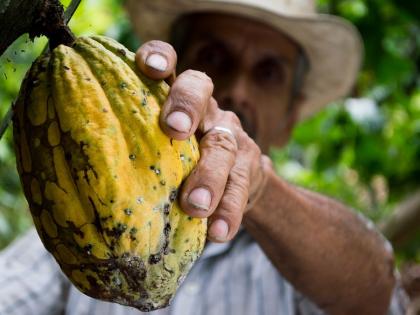Cocoa Farmers Warn All Cocoa Trees Could Be Destroyed by 2030 Without Fair Prices and Support
By Lokmat English Desk | Updated: April 18, 2025 14:55 IST2025-04-18T14:54:03+5:302025-04-18T14:55:53+5:30
Farmers in Côte d’Ivoire (Ivory Coast) have warned that cocoa trees could be destroyed by 2030 if they do ...

Cocoa Farmers Warn All Cocoa Trees Could Be Destroyed by 2030 Without Fair Prices and Support
Farmers in Côte d’Ivoire (Ivory Coast) have warned that cocoa trees could be destroyed by 2030 if they do not receive financial support and access to fairer markets, according to a report by The Independent. As the world’s largest producer of cocoa, Ivory Coast — particularly the Bafing-Tonkpi region — supplies raw materials for chocolate products to global markets, including the UK.
Low cocoa prices, ageing plantations, rising diseases, and an increasingly unpredictable climate have caused a significant drop in productivity, pushing production costs higher. While shoppers in the UK paid up to 50% more for chocolate this Easter, many farmers remain trapped in poverty, receiving minimal returns at the farm level.
A local farming cooperative reported that output from 5,000 cocoa producers has declined by 30% in recent years. As a result, many farmers have started shifting to other crops such as rubber and palm.
Biabate Posseni, a 34-year-old cocoa farmer, blamed the changing climate for reduced productivity. “When we wait for rain, it doesn’t come. When we need the sun, there’s no sun — instead, we get too much rain,” he told The Independent.
Another farmer expressed concern about the future of cocoa farming, stating, “By 2030, if nothing is done, we won’t have any cocoa trees left. Climate change will destroy them all. There is a real need for collective support to tackle this challenge and continue cocoa production.”
Yeyasso, a 42-year-old farmer in the Bogouiné area, shared that his two-hectare farm once yielded 700 kilograms of cocoa annually. Last year, however, he produced less than half of that — just 300 kilograms. “We can see the change,” he said, explaining how intense rains are increasing the spread of black rot disease. “We’re definitely scared because we don’t know if these unpredictable conditions will stop.”
Another major concern for Ivorian farmers is swollen shoot disease, a viral infection spreading from the eastern region of the country. It causes bloated branches and deformed cocoa pods. One farmer from the village of Yapleu said his household income has nearly vanished since the disease devastated his four-hectare farm in 2016.
While the government, regulators, and cooperatives are working to address climate-related challenges, resources remain limited. Farmers are urging for more immediate and targeted support to save the cocoa industry — and their livelihoods.
Open in app